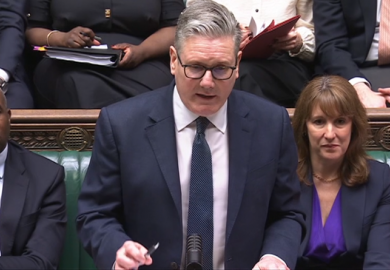In this landmark year for democracy, more than 80 countries and over half the world’s population will vote in elections. In the UK, however, universities are very unlikely to find themselves on the crowded political agenda, except perhaps as punching bags.
Across the world, economic unease and security issues are expected to squeeze out any sustained focus on education, too. This does not mean that universities should take a back seat, however. Quite the opposite.
In an increasingly febrile and fractious public sphere, we must do our best to proactively highlight the benefits of universities to the world, bringing together our varied and invaluable communities to explain and evidence the unique and critical value the sector offers – at a time when, arguably, it has never been more needed.
This month, the University of East London (UEL) had the privilege of convening one such community by hosting the third Congress of the European Association of Professors Emeriti (EAPE). The significance of hosting such a congress resonates deeply with UEL’s ethos and aspirations. Situated as a global gateway, from our beginnings in the 1898 Docklands of the second industrial revolution to today’s fourth and into the fifth technological era, our institution has long championed diversity, collaboration and the pursuit of knowledge beyond geographical boundaries. EAPE’s mission of fostering active cooperation among researchers, advancing knowledge and offering recommendations to shape the future of higher education could not be more relevant to our current moment, either.
As scholars and leaders interested and invested in the evolving role of universities in a post-globalisation age, we believe that higher education is uniquely placed as a global sector to tackle the most complex issues facing humanity and to further cross-cultural understanding in pursuit of a more peaceful world. In order to do so, we must avoid complacency and learn from our experiences of the past – not just within individual countries, but on a global scale.
THE podcast: how to turn university students into engaged citizens – and voters
One of the most pervasive myths that defined early globalisation was of the unassailable progression of liberal democracy and free-market capitalism across the world. Instead, we are today faced with persisting conflicts in the global arena, the limitations of market regulation in addressing multifaceted socio-political issues and the monopolistic tendencies inherent in emerging digital technologies to paint a compelling picture of our complex world. Indeed, the landscape of the world economy has undergone immense shifts over the past three decades – changes that higher education institutions cannot and should not ignore. They must instead seek to be increasingly agile and proactive in addressing societal challenge, supporting talent wherever it is found and ensuring that sections of society are not excluded or left behind.
As we enter the fifth industrial revolution, traditional industries are transforming and the skills needed by the global workforce are developing at pace. Such changes offer the world two contrasting paths: the rise of populist and protectionist movements that pit countries and communities against each other, or a collective drive for sustainable development that fosters global cooperation. If the latter is to win out, higher education will need to play a pivotal role by providing open and equitable access to research, training and innovation.
As the UK grapples with an ever-changing and increasingly challenging higher education landscape, we must look outward and remember our global context, arguing for the centrality of universities not only to hyper-local issues, but also to solving some of our most intractable geopolitical problems. From boosting development in rural areas of Italy to tackling health inequalities in the London Borough of Newham, there are countless examples of how the civic impact of universities worldwide is making tangible positive change to people’s lives every day. And there is a reason why the vast majority of ground-breaking research and work done to tackle issues such as climate change is driven by university academics.
In the realm of this advanced digital economy, where power dynamics are often dictated by American and Chinese corporations, Europe faces a daunting task. Despite losing ground in certain high-tech sectors, the EU and the wider continent remains a formidable force in areas such as electronics, pharmaceuticals and scientific instruments.
Yet the real imperative lies in investing in climate technologies and innovations that prioritise social justice, health gain and democracy – values intrinsic to Europe’s identity. As the world navigates towards a new paradigm of sustainable development, universities stand as vanguards of progress and agents of change.
Our global leaders know this and have acknowledged the transformative potential of education in shaping a better future by embedding it in their plans for prosperity. The United Nations’ Sustainable Development Goals (SDGs) also take care to highlight the importance of quality education, innovation and partnerships, guiding universities towards high-impact areas of investment and action. To have universities singing from the same hymn sheet is not to deny them their individual identities – rather, commitment to the SDGs recognises that, collaboratively, our higher education institutions can do more than they can alone.
For Europe to assert its leadership in the global arena, a cohesive and integrated university and research system is indispensable.
Amanda Broderick is vice-chancellor and president at the University of East London and chair of London Higher. Patrizio Bianchi was Italy’s minister of education in 2021-22 and is now emeritus professor of applied economics at the University of Ferrara.
Register to continue
Why register?
- Registration is free and only takes a moment
- Once registered, you can read 3 articles a month
- Sign up for our newsletter
Subscribe
Or subscribe for unlimited access to:
- Unlimited access to news, views, insights & reviews
- Digital editions
- Digital access to THE’s university and college rankings analysis
Already registered or a current subscriber?








